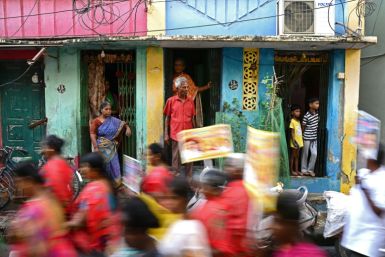Toyota chief sidesteps Congress
Toyota Motor Corp said on Wednesday it would install a system to ensure braking trumps acceleration for all new car models as it seeks to limit the damage from its vast recall woes.
But in a statement unlikely to appease U.S. lawmakers, Toyota President Akio Toyoda said he believed North America chief Yoshimi Inaba was the logical choice to testify at the U.S. congressional hearings scheduled for later this month.
I have full confidence in the management of Toyota Motor North America, led by Mr. Inaba, and I believe he is the best placed to testify, Toyoda told a news conference in Tokyo.
U.S. Rep Darrell Issa, the top Republican on the House Oversight and Government committee, has said he would support a subpoena to force Toyoda's appearance to explain their handling of the series of recalls totaling more than 8.5 million vehicles worldwide for problems with braking and unintended acceleration.
Toyoda said he planned to visit the United States at some point but that the best timing needed to be worked out. He would consider whether to testify when and if there was a request, he added.
I will focus on internal reform to improve quality and support Inaba from our headquarters, Toyoda said.
Toyoda's news conference follows the automaker's announcement that would halt U.S. production further to match slowing sales and as U.S. regulators opened an investigation into whether it had acted in a timely fashion on the recalls.
The issue has dealt a devastating blow to Toyota's reputation built on quality, safety and reliability, not long ago the envy of the auto industry.
Up to 34 crash deaths have been blamed on unintended acceleration in Toyota vehicles since 2000, according to consumer complaints filed with U.S. regulators.
The National Highway Traffic Safety Administration has said it believes five deaths are related to floor mats and none to the sticky pedal problem.
Toyota's brake over-ride system, similar to others used by a number of automakers, would cut engine power when the brake and accelerator pedals at the same time.
Toyoda said the world's biggest automaker may have grown too fast, neglecting adequate training of staff to ensure quality did not trail behind.
The basic rule of the Toyota Production System is to only build as many cars as there is demand for, and we ourselves broke that rule, he told his third news conference in two weeks.
Toyota said it would set up training centers for quality improvement around the world, much like it did to train its growing overseas staff on Toyota's famous manufacturing process.
Toyota said it would also assign a chief quality officer in each major region as part of the Special Committee for Global Quality announced earlier this month.
PRODUCTION CUTS
Toyota plans to shut production down at two U.S. factories for a total of at least 11 days to match slowing sales, barely a week after resuming production of eight recalled models at six North American plants.
The latest cutbacks throw further doubt on the pace of Toyota's earnings recovery after the company had only two weeks ago estimated the recalls to hit global sales by 100,000 units in the financial year to the end of March.
There's no question that sales are suffering (in the United States), said Mamoru Kato, analyst at Tokai-Tokyo Securities.
They've estimated a 100,000-unit impact for this financial year. If this multiplies to several hundred thousands next (financial) year, that could lead to a year-on-year fall in sales, and a big hit to earnings, he said.
Toyoda said that production cuts had so far been within expectations and that he believed the company could stem further sales declines, although it was impossible to tell for sure.
Toyoda, the grandson of company founder Kiichiro Toyoda, faces one of Toyota's deepest crises just seven months into his job as the massive recalls dent confidence in the automaker.
Toyota is already suffering from declining sales in the United States, its biggest and usually most profitable market, after it suspended sales of about half its inventory of vehicles including the popular Camry and Corolla sedans due to potentially sticky accelerator pedals.
In January, its U.S. sales dropped 16 percent to the lowest level in more than a decade, and another sharp decline is expected for February since Toyota dealers expect that repairs to inventory will take most of the month to complete.
REPUTATION DAMAGED
Some analysts said they saw limited direct damage from the U.S. production cuts announced on Tuesday, and that the bigger concern was to Toyota's image as U.S. regulators address the possibility of any wrongdoing by the automaker.
Reduction of estimated output of a little over 10,000 vehicles would have only a limited impact, while the move shows Toyota's careful efforts to minimize the impact of a drop in sales and a rise in incentives, said Nomura Securities analyst Shotaro Noguchi.
Like most automakers, Toyota books revenue when it produces vehicles and ships them to dealers. By cutting output, it is choosing to take a sales hit to keep inventories of unsold vehicles from rising.
The probe by the National Highway Traffic Safety Administration could lay the groundwork for officials to fine Toyota if they determine the manufacturer violated its legal obligations. It also faces a number of lawsuits over the faults and its handling of them.
Prior to the news conference, shares of Toyota ended flat at 3,380 yen in Tokyo on Wednesday, while rivals Honda Motor Co and Nissan Motor Co.
Toyota shares have fallen a fifth from a recent peak on January 21, wiping out more than $25 billion in market capitalization.
(Additional reporting by Yumiko Nishitani and Yoshifumi Takemoto; Writing by Edwina Gibbs; Editing by Lincoln Feast)
© Copyright Thomson Reuters 2024. All rights reserved.











